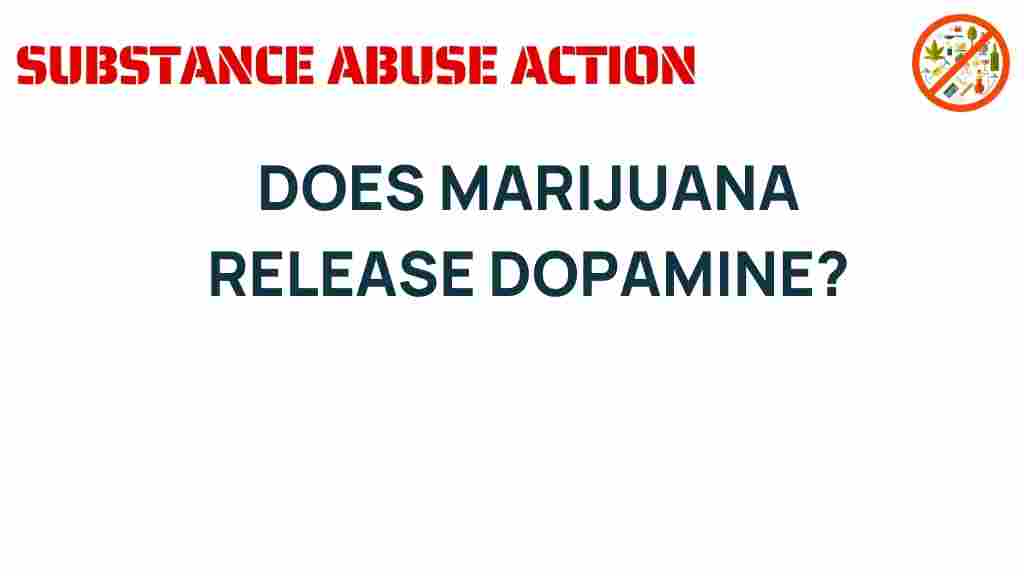Unraveling the Mystery: Does Marijuana Release Dopamine?
Marijuana has long been a topic of debate, particularly regarding its effects on the brain and behavior. Among the numerous substances in the cannabis plant, one compound stands out in discussions about pleasure and addiction: dopamine. In this article, we will explore the relationship between marijuana and dopamine, delving into neurochemistry, mental health, and the implications of substance use.
Understanding the Basics of Dopamine
Dopamine is a neurotransmitter that plays a crucial role in the brain’s reward system. It is often referred to as the “feel-good” chemical because it is associated with feelings of pleasure and satisfaction. When we engage in activities that we enjoy—such as eating our favorite food, exercising, or even socializing—dopamine is released, reinforcing those behaviors.
The release of dopamine is essential for motivation and learning, as it encourages us to repeat activities that bring us pleasure. However, the same mechanism can also contribute to the development of addictions, as substances that artificially increase dopamine levels can lead to compulsive behavior.
The Neurochemistry of Marijuana
Marijuana, or cannabis, contains various active compounds known as cannabinoids, with tetrahydrocannabinol (THC) being the most well-known. THC interacts with the endocannabinoid system in the brain, which plays a critical role in regulating mood, memory, appetite, and pain sensation.
When marijuana is consumed, THC binds to cannabinoid receptors, resulting in various psychoactive effects. Research indicates that this interaction can lead to increased dopamine levels, particularly in the brain’s reward pathways. Understanding how these processes work can help us unravel the mystery of marijuana’s impact on dopamine.
Marijuana and Dopamine Release
Numerous studies have examined the effects of marijuana on dopamine release. Here are some key findings:
- Increased Dopamine Levels: Research suggests that THC can increase dopamine release in certain brain regions, particularly the nucleus accumbens, which is integral to the reward circuit.
- Short-Term Effects: The increase in dopamine levels is often temporary and can lead to feelings of euphoria and pleasure while under the influence of marijuana.
- Long-Term Use: Chronic marijuana use may lead to changes in brain chemistry, potentially resulting in a decreased ability to release dopamine naturally.
The Connection Between Marijuana and Addiction
The relationship between marijuana, dopamine, and addiction is complex. While not everyone who uses marijuana becomes addicted, some individuals may develop problematic patterns of use. Here’s how marijuana use can lead to addiction:
- Reinforcement of Use: The initial pleasurable effects of marijuana, driven by dopamine release, can reinforce the behavior, leading to repeated use.
- Withdrawal Symptoms: Some users may experience withdrawal symptoms when not using marijuana, which can drive them to continue using it to avoid discomfort.
- Changes in Brain Chemistry: Prolonged marijuana use can alter brain chemistry, potentially leading to a decreased response to dopamine and a reliance on the substance for pleasure.
Impacts on Mental Health
Marijuana’s effects on dopamine and brain chemistry can also have implications for mental health. While some individuals use marijuana to self-medicate conditions like anxiety or depression, the relationship is not straightforward.
- Short-Term Relief: Some users report temporary relief from anxiety and mood disorders when using marijuana.
- Potential for Exacerbation: For others, particularly those predisposed to mental health issues, marijuana can exacerbate symptoms of anxiety, depression, or psychosis.
- Long-Term Effects on Mental Health: Long-term marijuana use may alter dopamine pathways, potentially leading to increased risk for mental health disorders.
Research Insights into Marijuana and Dopamine
The field of research surrounding marijuana, dopamine, and neurochemistry is continually evolving. Here are some key studies and findings:
- Neuroimaging Studies: Neuroimaging techniques, such as PET scans, have shown increased dopamine release in individuals who have consumed marijuana.
- Animal Studies: Research on animal models has demonstrated that THC can induce dopamine release, supporting the idea that marijuana can impact brain chemistry.
- User Reports: Surveys and studies on self-reported experiences indicate that many users associate marijuana use with heightened pleasure and reward.
Possible Troubleshooting Tips for Users
If you or someone you know is using marijuana and is concerned about its effects on dopamine and mental health, consider the following tips:
- Moderation: Use marijuana in moderation to minimize potential negative effects on brain chemistry.
- Awareness: Stay informed about the potential mental health risks associated with marijuana use, especially if you have a history of mental health issues.
- Seek Professional Help: If you find it challenging to control marijuana use, consider seeking help from a mental health professional.
Conclusion: The Balance of Pleasure and Risks
Marijuana’s influence on dopamine levels highlights the delicate balance between pleasure and potential addiction. While marijuana can lead to increased dopamine release and temporary feelings of euphoria, it is essential to be aware of the long-term implications on brain chemistry and mental health.
As research continues to evolve, understanding the neurochemical effects of marijuana will be crucial in navigating its use responsibly. If you’re curious about the effects of marijuana on your brain or mental health, consult with a healthcare professional or explore credible sources for more information.
For further reading on the neurochemistry of addiction, check out this informative article. Also, for personal experiences and community support, visit this forum.
This article is in the category Addiction and created by SubstanceAbuseAction Team
